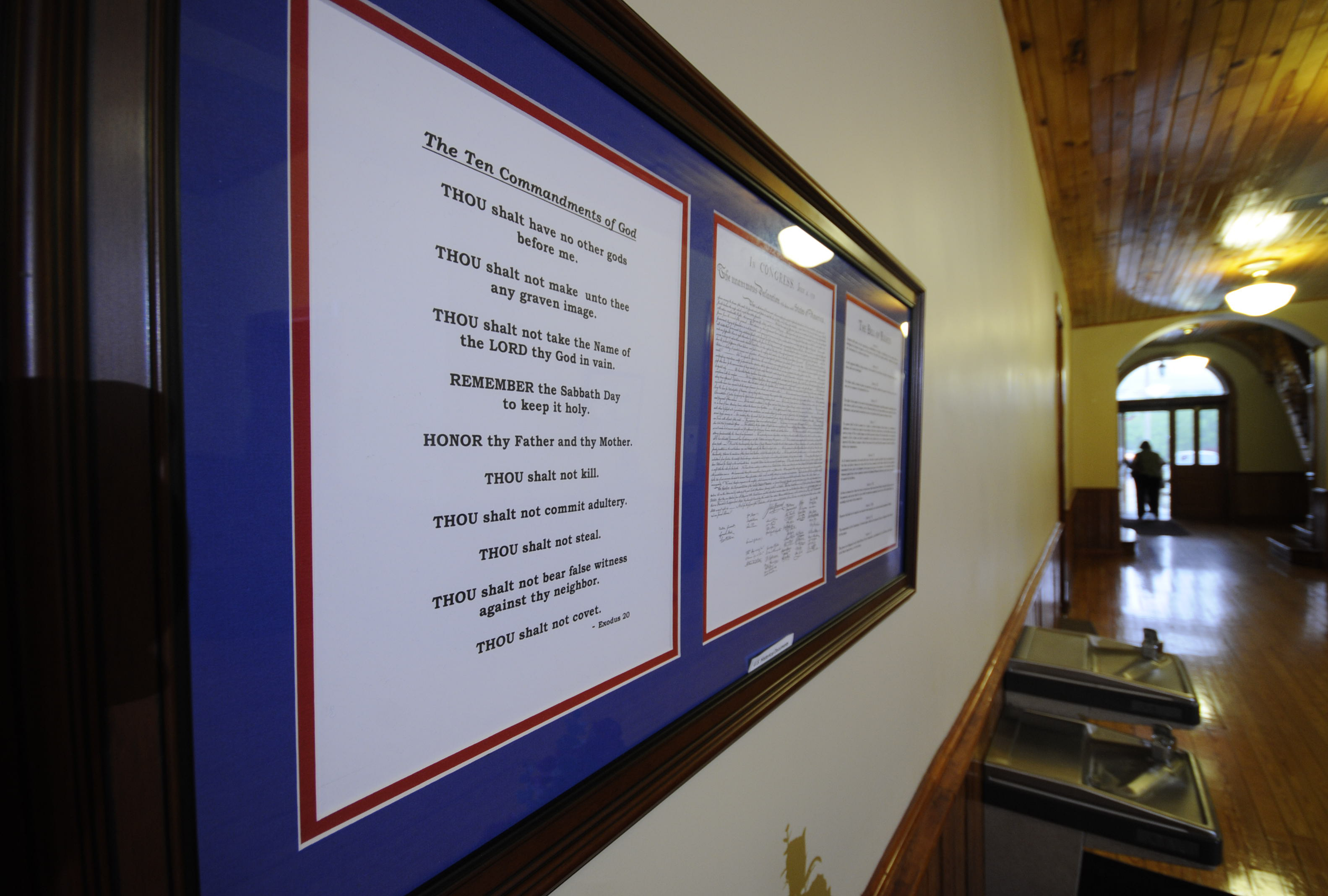TO VIEW THE BILLTo see a copy of the proposed Ten Commandments legislation, go to www.capitol.tn.gov/Bills/107/Bill/HB2658.pdf
NASHVILLE -- Two socially conservative Tennessee lawmakers are promoting what they think is a legally defensible way for local governments to display the Ten Commandments in county courthouses or on public grounds.
Sen. Mike Bell, R-Rice-ville, and Rep. Matthew Hill, R-Jonesboro, last week introduced a bill authorizing counties and cities to set up displays of "historical documents and monuments and writings" that have been "recognized to commemorate freedom and the rich history of Tennessee and the United States."
First on the list of enumerated documents is the Ten Commandments, followed by England's Magna Carta, the Pilgrims' Mayflower Compact, the Declaration of Independence, the U.S. Constitution, the Bill of Rights, the Tennessee Constitution and "other such historically significant documents."
Bell said Friday he thinks "it's important that our local government buildings and our local legislative bodies know they have the right to post those documents."
He said displays that include the Ten Commandments should withstand legal challenges in a state where several counties, including Hamilton, have been directed by federal courts to remove stand-alone Ten Commandments displays.
"I think a very sound argument can be made that the foundation of our law, or at least Western civilization law, can be [attributed to the] Ten Commandments," Bell said.
"Several of the counties I represent have documents posted, not just the Ten Commandments but other historical documents as well that would be addressed in this bill," Bell said. "The bill doesn't only address the Ten Commandments, but the Ten Commandments would be one of them."
Barry Lynn, executive director of the Washington-based Americans United for the Separation of Church and State, said he thinks such moves are constitutionally suspect.
"They [proponents] assume that the Ten Commandments had something to do with the founding of the United States, and that's absolutely false," he said.
Lynn noted that Protestants, Catholics and Jews use different versions of the Ten Commandments, and he said five commandments have no connection to state or federal laws.
"We don't make it illegal to covet your neighbor's SUV," Lynn said. "We don't make it illegal to be unnice to your parents."
Americans can choose whether and whom to worship, or not to worship at all, he said, adding, "There's no secular component to these other rules. ... [They] played no role in the framework of this country."
The bill is obviously directed at the Ten Commandments, he said, because other documents cited, such as the state and federal constitutions, easily can be displayed right now.
Suzanna Sherry, a Vanderbilt University School of Law professor and expert on constitutional law, said the legality of such displays "depends on exactly the context" in which governments act to install them.
"This is a really difficult question, and the Supreme Court has visited it and visited it a number of times," Sherry added.
She said justices have examined "what were the circumstances under which it was posted. What were the likely motivations of those who posted it? ... What was the message that both was intended to be sent and received ... by those who viewed it?"
CNN reported in October that the U.S. Supreme Court declined to hear a case involving an Ohio state judge who lower federal courts said violated the Constitution's "establishment" clause.
The judge displayed a poster in his courtroom that contrasted a list of "Moral Absolutes," such as the Ten Commandments, to "Moral Relativism," which cited sources such as the Humanist Manifesto.
Hedy Weinberg, executive director of the American Civil Liberties Union in Tennessee, said courts "have talked about two types of displays. One is where the Ten Commandments stand alone in a public building, and the other is a display of a number of different documents that have been identified by folks who want to put [them] up ... as historical documents that are part of the foundation of this country."
She said courts have ruled that depending "on how they put up the display and what the rationale is, [it] would in fact pass constitutional muster."
"That said," Weinberg added, "I think we need to step back and talk about how religious freedom flourishes in the country for the single reason that individuals are able to decide for themselves when, how and to whom they want to pray."
Protections in the Bill of Rights are "so fundamental that it's always troubling when government tries to insert itself into promoting particular religious doctrines," she said.
When Hamilton County commissioners voted to install Ten Commandments tablets following the Sept. 11, 2001, terrorist attacks, the ACLU-Tennessee sued along with some county taxpayers.
In 2002, U.S. District Court Judge R. Allan Edgar in Chattanooga ruled the tablets had to be removed.
Edgar said the nation's founders consciously decided to separate religion and government, which he noted "has served us well."
Efforts to reach House sponsor Hill were unsuccessful.
In 2006, Hill, a conservative Christian radio show host, introduced similar legislation. It was quashed in a House subcommittee when Democrats controlled the chamber.
Republicans are now in charge.
Bell said he introduced the Senate companion bill at Hill's request. He said if Hill succeeds in passing his measure, he will proceed in the Senate.

